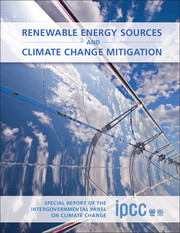Crossref Citations
This Book has been
cited by the following publications. This list is generated based on data provided by Crossref.
Wilson, Charlie
Grubler, Arnulf
Gallagher, Kelly S.
and
Nemet, Gregory F.
2012.
Marginalization of end-use technologies in energy innovation for climate protection.
Nature Climate Change,
Vol. 2,
Issue. 11,
p.
780.
House, Joanna I.
Bellarby, Jessica
Böttcher, Hannes
Brander, Matthew
Kalas, Nicole
Smith, Pete
Tipper, Richard
and
Woods, Jeremy
2012.
Understanding the Earth System.
p.
202.
Sinha, Parikhit
Balas, Robert
Krueger, Lisa
and
Wade, Andreas
2012.
Fate and transport evaluation of potential leaching risks from cadmium telluride photovoltaics.
Environmental Toxicology and Chemistry,
Vol. 31,
Issue. 7,
p.
1670.
Kubička, David
and
Černý, Radek
2012.
Upgrading of Fischer–Tropsch Waxes by Fluid Catalytic Cracking.
Industrial & Engineering Chemistry Research,
Vol. 51,
Issue. 26,
p.
8849.
Anadón, Laura D.
Bosetti, Valentina
Bunn, Matthew
Catenacci, Michela
and
Lee, Audrey
2012.
Expert Judgments about RD&D and the Future of Nuclear Energy.
Environmental Science & Technology,
Vol. 46,
Issue. 21,
p.
11497.
Ortiz, Willington
Dienst, Carmen
and
Terrapon-Pfaff, Julia
2012.
Introducing Modern Energy Services into Developing Countries: The Role of Local Community Socio-Economic Structures.
Sustainability,
Vol. 4,
Issue. 3,
p.
341.
Guo, Meng
Wang, Xiufeng
Li, Jing
Yi, Kunpeng
Zhong, Guosheng
and
Tani, Hiroshi
2012.
Assessment of Global Carbon Dioxide Concentration Using MODIS and GOSAT Data.
Sensors,
Vol. 12,
Issue. 12,
p.
16368.
Lorenz, K.
Crutzen, P. J.
Lal, Rattan
and
Töpfer, K.
2012.
Recarbonization of the Biosphere.
p.
41.
Anitescu, George
and
Bruno, Thomas J.
2012.
Liquid Biofuels: Fluid Properties to Optimize Feedstock Selection, Processing, Refining/Blending, Storage/Transportation, and Combustion.
Energy & Fuels,
Vol. 26,
Issue. 1,
p.
324.
Förstner, Ulrich
2012.
Umweltschutztechnik.
p.
1.
Myhrvold, N P
and
Caldeira, K
2012.
Greenhouse gases, climate change and the transition from coal to low-carbon electricity.
Environmental Research Letters,
Vol. 7,
Issue. 1,
p.
014019.
Parkinson, Simon
Wang, Dan
and
Djilali, Ned
2012.
Toward low carbon energy systems: The convergence of wind power, demand response, and the electricity grid.
p.
1.
Perkins, John H.
2012.
Special Report on Renewable Energy Sources and Climate Change Mitigation: 2011. Intergovernmental Panel on Climate Change, Working Group III—Mitigation of Climate Change. Cambridge University Press, Cambridge, England. 1,088 pp. $100.00 hardcover (ISBN13: 9781107607101). Also available for free at http://srren.ipcc-wg3.de/report (ca. 1,544 pp.)..
Environmental Practice,
Vol. 14,
Issue. 3,
p.
237.
Cox, Blair J.
and
Ekerdt, John G.
2012.
Depolymerization of oak wood lignin under mild conditions using the acidic ionic liquid 1-H-3-methylimidazolium chloride as both solvent and catalyst.
Bioresource Technology,
Vol. 118,
Issue. ,
p.
584.
Lehmann, Paul
Creutzig, Felix
Ehlers, Melf-Hinrich
Friedrichsen, Nele
Heuson, Clemens
Hirth, Lion
and
Pietzcker, Robert
2012.
Carbon Lock-Out: Advancing Renewable Energy Policy in Europe.
Energies,
Vol. 5,
Issue. 2,
p.
323.
O'Brien, Karen
Pelling, Mark
Patwardhan, Anand
Hallegatte, Stephane
Maskrey, Andrew
Oki, Taikan
Oswald-Spring, Úrsula
Wilbanks, Thomas
Yanda, Pius Zebhe
Giupponi, Carlo
Mimura, Nobuo
Berkhout, Frans
Biggs, Reinette
Brauch, Hans Günter
Brown, Katrina
Folke, Carl
Harrington, Lisa
Kunreuther, Howard
Lacambra, Carmen
Leichenko, Robin
Mechler, Reinhard
Pahl-Wostl, Claudia
Przyluski, Valentin
Satterthwaite, David
Sperling, Frank
Sygna, Linda
Tanner, Thomas
Tschakert, Petra
Ulsrud, Kirsten
and
Viguié, Vincent
2012.
Managing the Risks of Extreme Events and Disasters to Advance Climate Change Adaptation.
p.
437.
Srinivasa Rao, P.
Kumar, C. Ganesh
Malapaka, Jayalakshmi
Kamal, Ahmed
and
Reddy, Belum V. S.
2012.
Effect of Micronutrient Treatments in Main and Ratoon Crops of Sweet Sorghum Cultivar ICSV 93046 Under Tropical Conditions.
Sugar Tech,
Vol. 14,
Issue. 4,
p.
370.
Bakken, Tor Haakon
Sundt, Håkon
Ruud, Audun
and
Harby, Atle
2012.
Development of Small Versus Large Hydropower in Norway– Comparison of Environmental Impacts.
Energy Procedia,
Vol. 20,
Issue. ,
p.
185.
Lee, Hoesung
and
Haites, Erik
2012.
Review of IPCC working group III findings on the impact of energy policy options on GHG emissions.
WIREs Energy and Environment,
Vol. 1,
Issue. 1,
p.
9.
Zhou, Yuyu
Eom, Jiyong
and
Clarke, Leon
2013.
The effect of global climate change, population distribution, and climate mitigation on building energy use in the U.S. and China.
Climatic Change,
Vol. 119,
Issue. 3-4,
p.
979.



